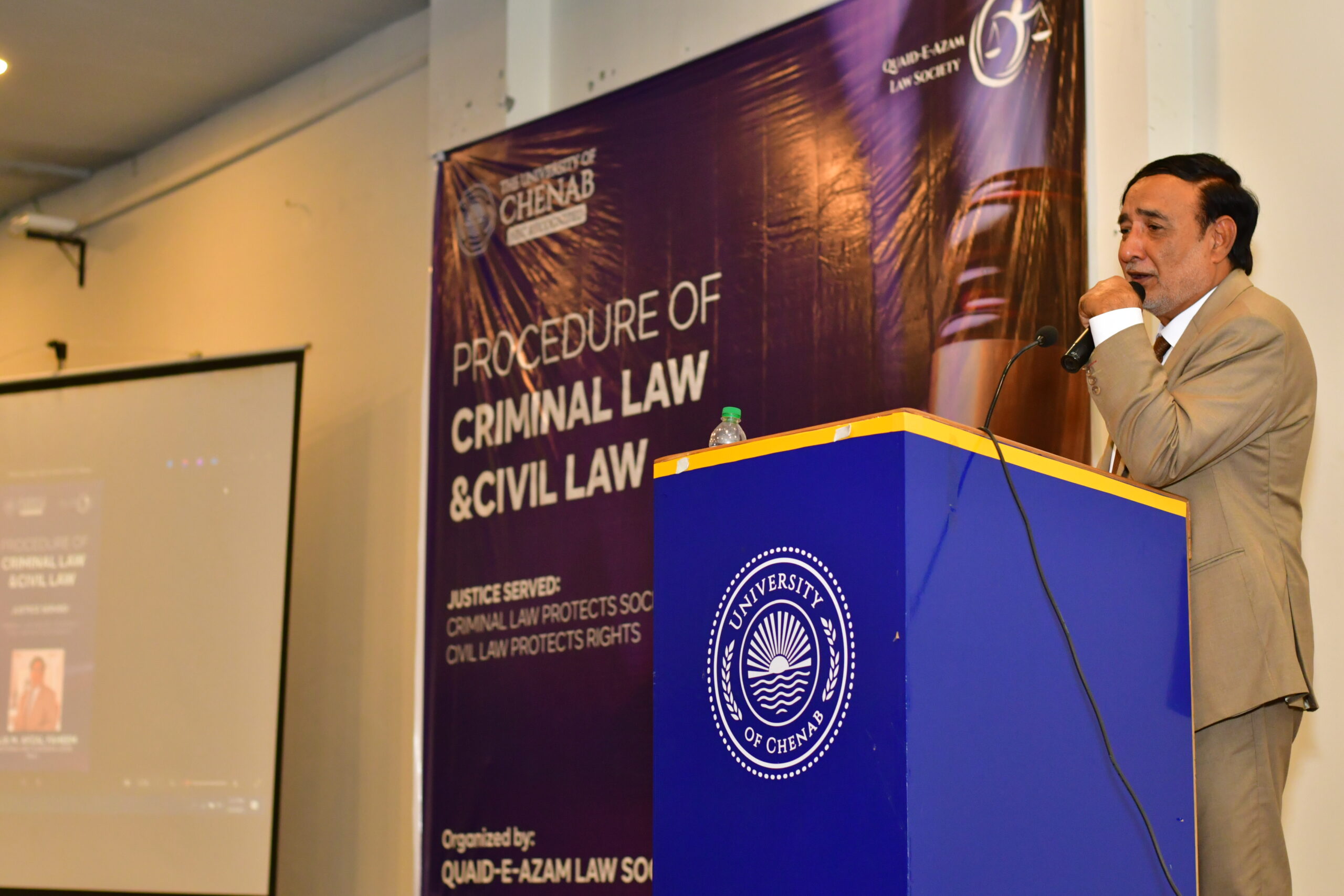Criminal Law Protects Society. Civil Law Protects Rights.
The Quaid-e-Azam Law Society at The University of Chenab proudly hosted an educational seminar titled “Procedure of Criminal and Civil Law: Protecting Society and Rights.” The seminar aimed to strengthen students’ understanding of Pakistan’s legal framework, focusing on how law serves as both a shield for society and a voice for individual justice.
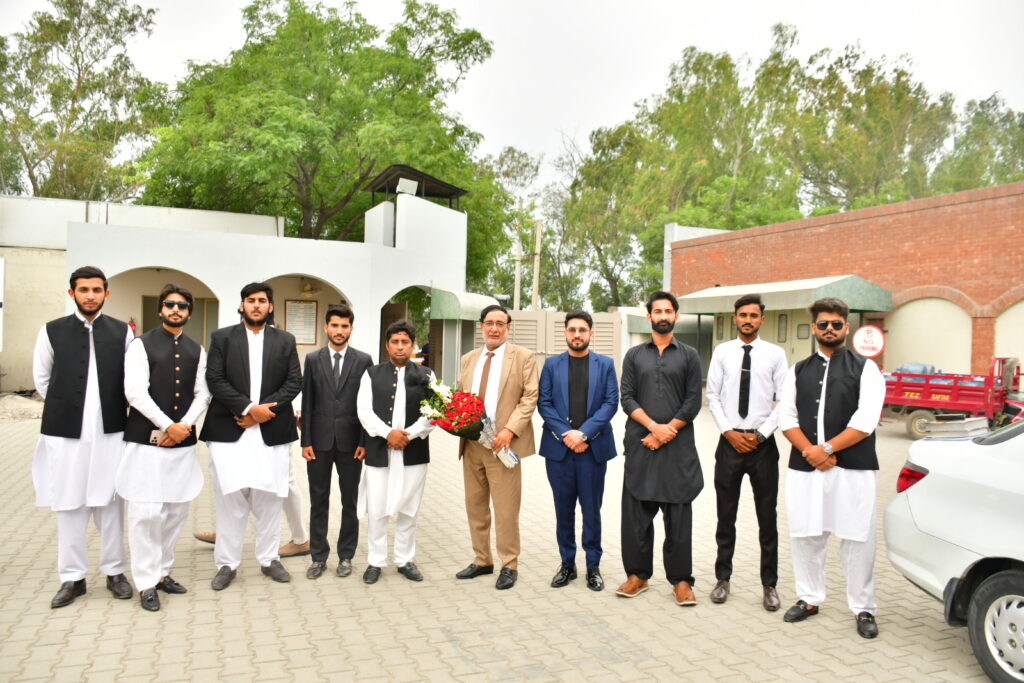
Featuring Raja M. Afzal Faheem, a retired Additional District & Sessions Judge, the event offered a rare opportunity to bridge legal theory with practical courtroom wisdom. Held in a professional and thought-provoking environment, this seminar advanced UChenab’s commitment to developing legal minds with clarity, ethical insight, and a strong grasp of judicial procedures.
Empowering Legal Education Through Practical Discourse
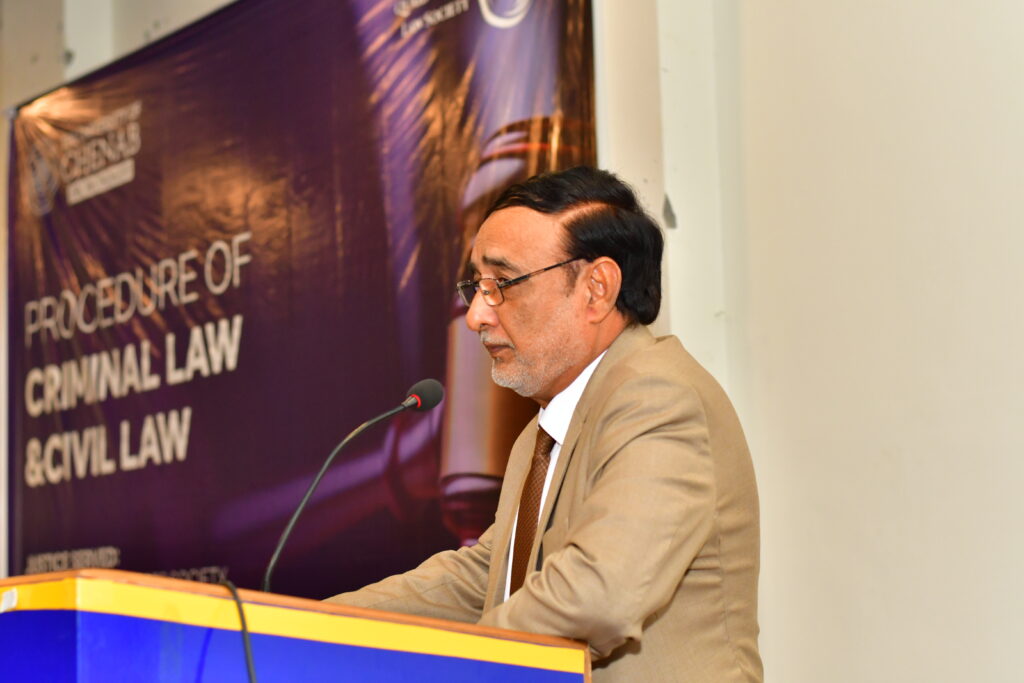
The Procedure of Criminal and Civil Law remains foundational in shaping Pakistan’s justice system. At UChenab, future lawyers are encouraged not just to memorize codes, but to understand their real-world applications. This event proved instrumental in that regard.
Raja Afzal Faheem brought decades of courtroom experience to the session, translating legal texts into life-changing principles. His focus extended beyond definitions and procedures, delving into how these laws impact real lives and societal structures.
Key Objectives of the Seminar
- To introduce law students to the real-time execution of criminal and civil law in Pakistan.
- To help students differentiate the scope, function, and application of both legal domains.
- To explore the ethical dimensions of practicing law in the civil and criminal courts.
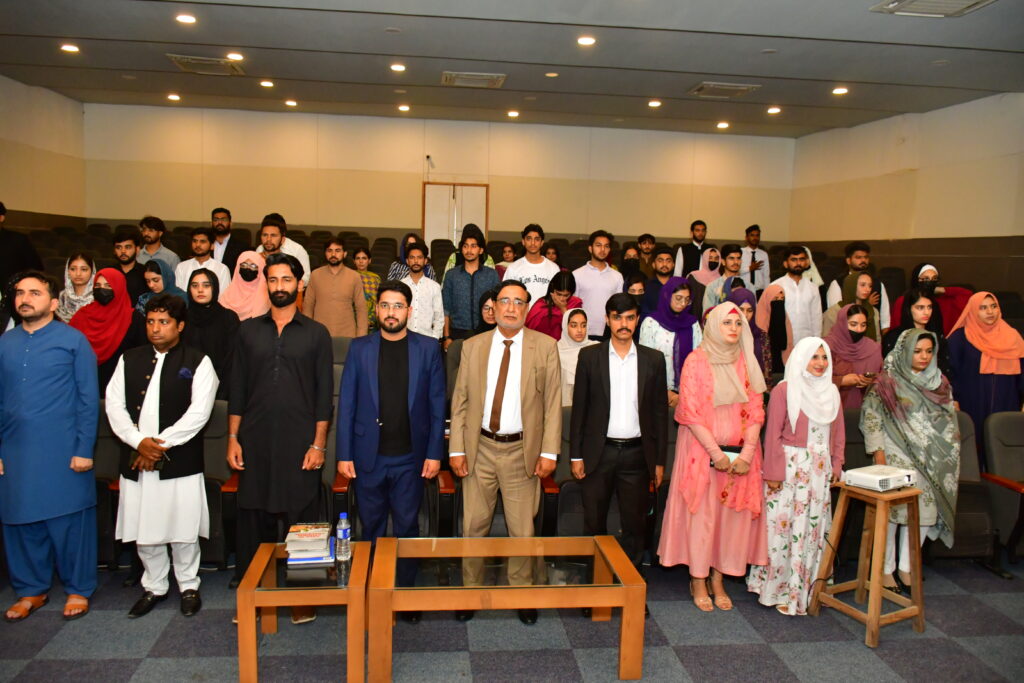
- To prepare students for legal careers by connecting academic theory with real-world legal processes.
- To cultivate respect for legal institutions and constitutional rights among emerging legal professionals.
Understanding the Procedure of Criminal and Civil Law
Criminal and civil laws function in tandem, each playing a distinct role in preserving justice. The speaker structured the seminar by clarifying the Procedure of Criminal and Civil Law through structured comparisons and courtroom illustrations.
Criminal Law: Preserving Public Order
Criminal law exists to maintain order and punish actions that threaten public safety. Raja Afzal explained that in criminal cases, the State acts as the prosecutor, reflecting the social contract between citizens and the legal system. With passion and clarity, he detailed the procedural steps—from First Information Reports (FIRs) to trial hearings, evidence evaluation, and sentencing. He emphasized that the goal of criminal law is not revenge, but deterrence and societal protection.
Students learned how proper investigation, strict adherence to evidence protocols, and the role of judicial discretion are essential to a fair criminal trial.
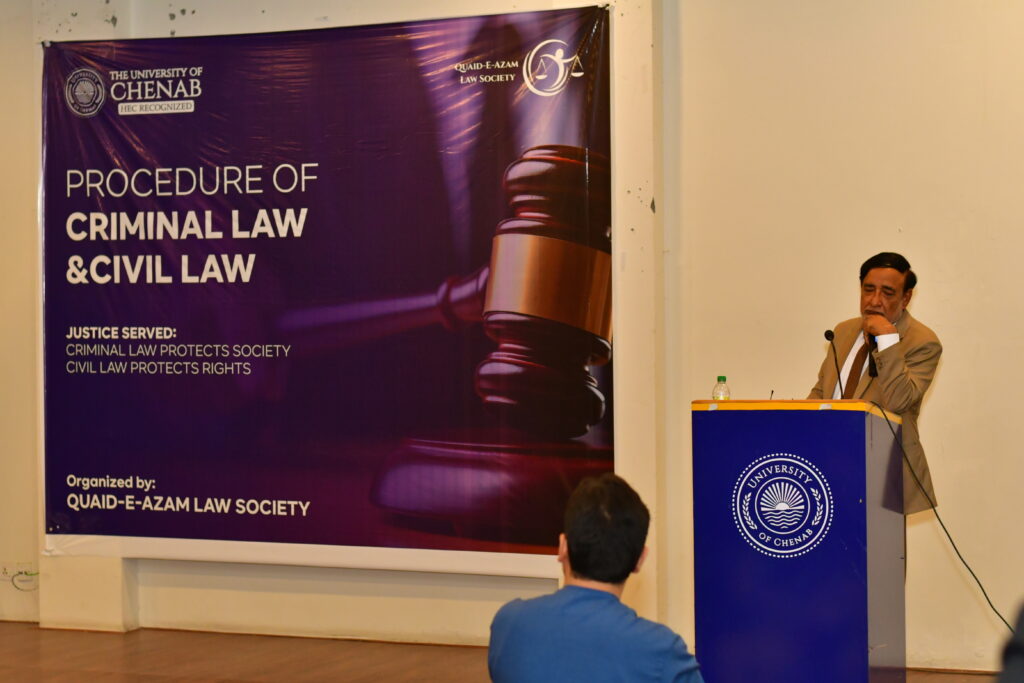
Civil Law: Safeguarding Individual Rights
On the other hand, civil law deals with disputes between individuals or institutions. This segment of the seminar illuminated how civil proceedings ensure justice in cases like contracts, torts, property disagreements, and family disputes.
The procedure of civil law was explained with examples of real cases involving breach of contract and family inheritance. Judge Faheem clarified how the burden of proof, court documentation, and stages of appeal work differently in civil trials compared to criminal ones. He pointed out that civil law doesn’t punish but compensates—its primary function is to resolve conflict and uphold personal rights.
Procedural Comparisons: Clarity Through Contrast
Raja Afzal Faheem used detailed case illustrations to compare how the Procedure of Criminal and Civil Law unfolds in courtrooms. From the role of a magistrate to the submission of evidence and final judgment, students gained insights that cannot be gleaned from textbooks alone. This comparative discussion deepened participants’ understanding of Pakistan’s dual justice system and the importance of ethical practice in both domains.
Interactive Dialogue: Law in Practice
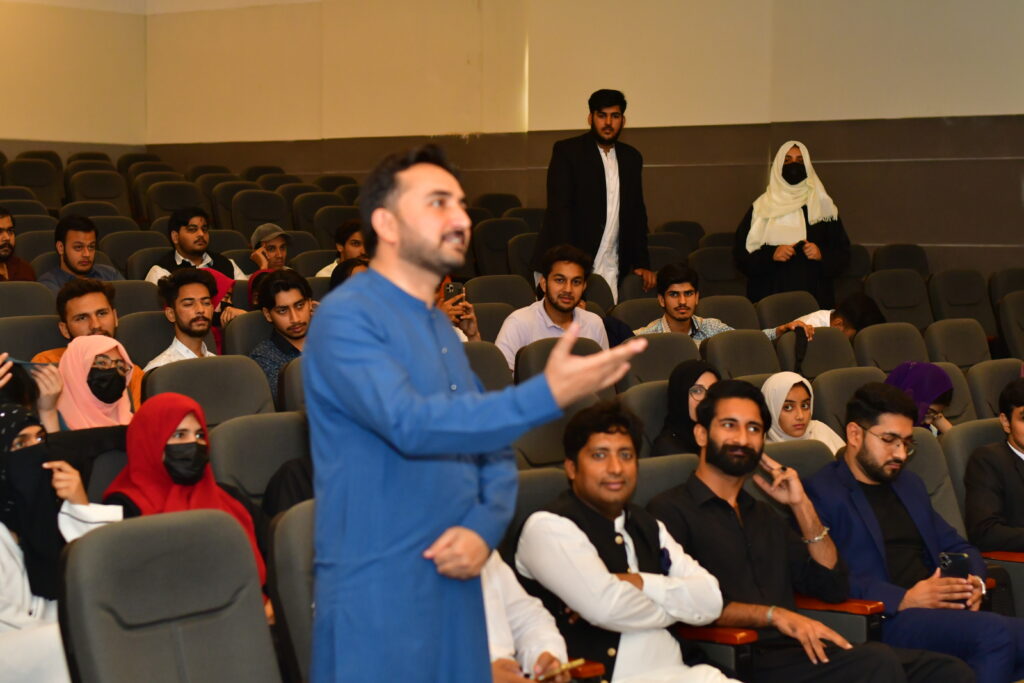
Following the lecture, the floor opened for an interactive Q&A session. Students eagerly engaged with the guest speaker, posing questions about recent legal reforms, bail procedures, and the role of digital evidence in modern trials. One key moment came when a student asked about delays in civil justice.
Judge Faheem responded by highlighting current procedural bottlenecks and the government’s efforts to digitize court systems. His honest, practical responses made complex issues feel accessible and manageable. This dialogue reinforced UChenab’s student-centered educational approach, where curiosity and inquiry are not only welcomed but encouraged.
The Role of UChenab in Legal Development
By hosting events like the Procedure of Criminal and Civil Law seminar, The University of Chenab continues to build an academic environment that fosters critical thinking, professional integrity, and legal expertise. The Quaid-e-Azam Law Society plays a pivotal role in creating such meaningful platforms for intellectual engagement.
This initiative aligned with UChenab’s broader mission: to nurture future leaders in law who understand the system from both theoretical and practical perspectives.
Bridging Academics and Legal Practice
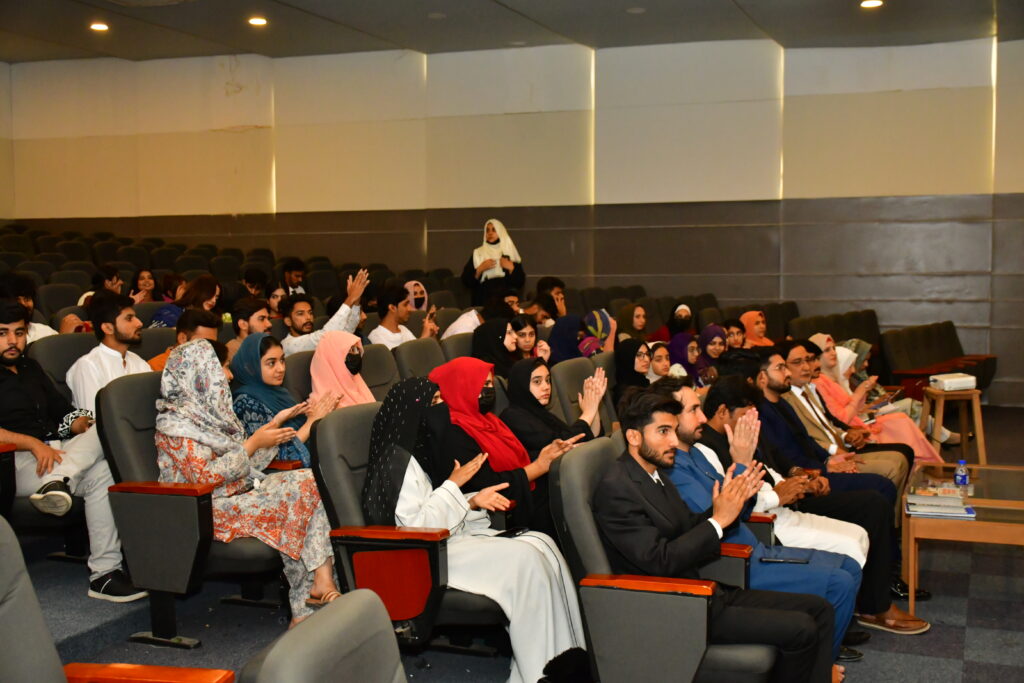
The seminar marked a significant step in integrating curriculum with courtroom realities. It encouraged students to consider the real implications of their academic pursuits.
- Legal Ethics: Emphasis was placed on the moral duties of lawyers and judges, ensuring justice without bias.
- Judicial Accountability: The importance of maintaining transparency, upholding constitutional rights, and serving public interest was reiterated.
- Career Readiness: Students gained insights into how to prepare for roles as prosecutors, defense attorneys, civil litigators, and future judges.
Highlights of the Seminar
- A seasoned guest speaker with decades of courtroom experience.
- Side-by-side comparison of civil and criminal legal systems.
- Interactive session addressing real-world legal challenges.
- Student engagement in policy, practice, and procedure discussions.
- Emphasis on ethical lawyering and constitutional values.
UChenab’s Vision for Law and Justice
Through academic rigor and community outreach, The University of Chenab envisions producing lawyers who are not only legally proficient but also socially responsible. This seminar exemplified that vision. Procedure of Criminal and Civil Law may appear theoretical in textbooks, but at UChenab, it is taught as a living system—a framework that adapts, evolves, and guides a just society.
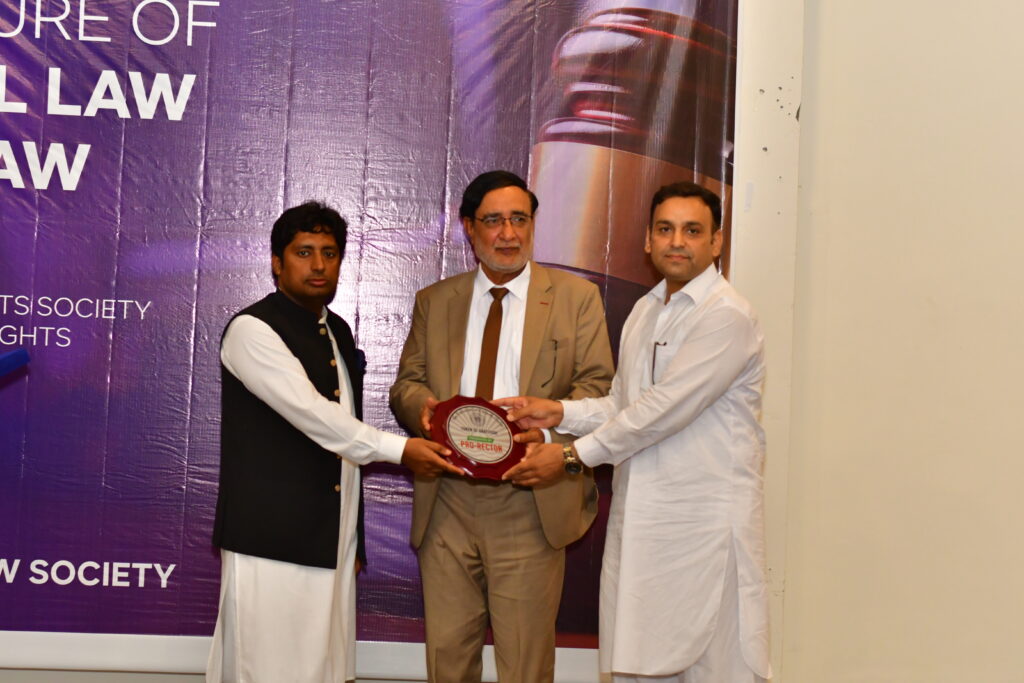
Why Events Like These Matter
- They foster an environment where law students engage with real judges and legal professionals.
- They bridge the gap between classroom knowledge and practical expertise.
- They cultivate a respect for justice, ethics, and societal service among future legal practitioners.
Conclusion: Preparing Tomorrow’s Advocates
The Procedure of Criminal and Civil Law seminar not only educated—it inspired. With guidance from legal veterans and support from UChenab’s academic leadership, students left with renewed confidence in their role as future custodians of justice. As the legal field continues to evolve, The University of Chenab remains steadfast in its mission to offer impactful learning experiences. Events like this one prepare students not just to enter the profession but to excel within it.

